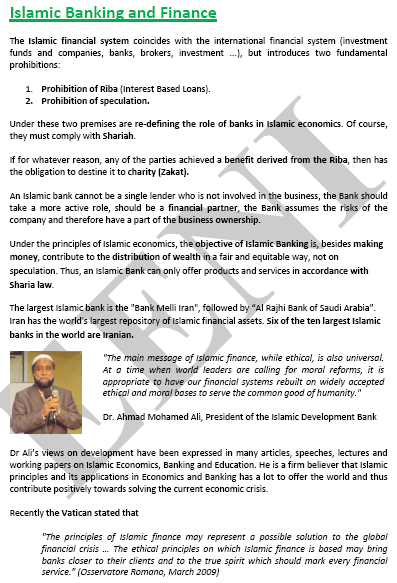Islamic Banking and Finance. Riba

Islamic financial system (two prohibitions) Riba and speculation
- Introduction to the Islamic Banking and Finance System
- Fundamental Prohibitions: Speculation and Interest Based Loans
- Compliance with the Sharia for financial products and services
- Types of loans in the Islamic Banking: Al-Mudaraba, Al-Murabaha, and Al-Musharaka
- Islamic Banks in the World
- Cases of banks and bankers applying the principles of the Islamic Banking
- Islamic Development Bank
- Mohammad Abdul Mannan
- Sulaiman Al-Rajhi
- Jawad Ahmed Bukhamseen

The Subject “Islamic Banking” belongs to the following Online Programs taught by EENI Global Business School:

Masters: International Business, Foreign Trade, Religions & Business.
Doctorate: Ethics, Religions & Business, Islamic Business, World Trade.
Languages:  or
or  Banca Islámica
Banca Islámica  Banque islamique
Banque islamique  Banca Islâmica.
Banca Islâmica.
“When the leaders of the World are searching for financial reforms; it is desirable to have a global financial system built on ethical and moral foundations widely accepted for the common good of humanity.” PhD Ahmad Mohamed Ali, President of the Islamic Development Bank
Islamic Banking and Finance.
The Islamic financial system coincides with the international financial system (investment funds and companies, banks, brokers, and investment), but introduces two fundamental prohibitions:
- Prohibition of Riba (Interest Based Loans)
- Prohibition of Speculation
Under these two premises are re-defining the banks role in the Islamic Economics. Of course; an Islamic Bank must comply with the Sharia.
An Islamic Bank cannot be a single lender who is not involved in the business, the Islamic Bank should take a more active role, should be a financial partner, the Islamic Bank assumes the risks of the company and therefore have a part of the business ownership.
Recently the Vatican stated that:
“The principles of Islamic Finance may represent a possible solution to the global financial crisis.” (Osservatore Romano, March 2009).
Under the Islamic Banking system there are mainly three types of loans:
- Al-Mudaraba
- Al-Murabaha
- Al-Musharaka
If for whatever reason, any of the parties achieved a benefit derived from the Riba then has an obligation to destine it to the charity (Zakat).
Under the principles of the Islamic Economics, the objective of the Islamic Banking is, besides making money, contribute to the wealth distribution in a fair and equitable way, not on speculation. Thus, an Islamic Bank can only offer products and services in accordance with the Sharia law.
Sample - Islamic Banking and Finance (Islamic Civilization)

The largest Islamic Bank is the “Bank Melli Iran,” followed by the “Al-Rajhi Bank of Saudi Arabia.”
- Iran has the world's largest repository of Islamic financial asset
- Six of the ten largest Islamic banks in the World are Iranian
The International Bank of Kuwait offers services of Islamic Banking.
Related information:
(c) EENI Global Business School (1995-2024)
We do not use cookies
Top of this page




